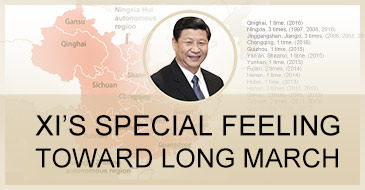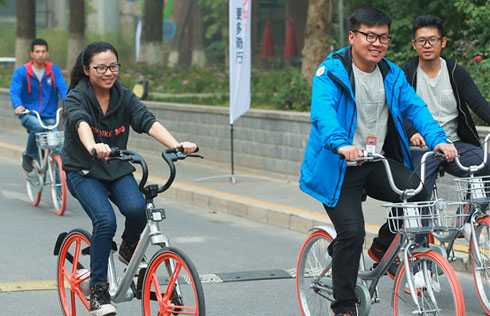Growing demand drives investor sentiment
Mobike is just one of a number of private companies focusing on public bike-sharing platforms in China.
It's major competitor is OFO, which mainly concentrates on university campuses. OFO claims to cover 200 colleges and universities in 20 cities nationwide. Accumulated orders have surpassed 10 million, with daily user numbers of more than 7,000.
In October, OFO expanded outside of campuses and started putting its bikes in public spaces.
Similar programs, owned by private companies such as Ubike and Ming, have also entered the market, or have announced that they will enter it soon.
The rising demand has attracted interest from private investors.
On Oct 13, Mobike confirmed that it had received funding from venture capitalists at home and abroad, including Hillhouse Capital Group, Warburg Pincus, Tencent and Sequoia Capital. The company declined to reveal how much it received through VC channels, but industry insiders said the sum was approximately $100 million.
OFO has also announced a new round of financing, valued at $130 million. The lead investors include Coatue Management, the electronics manufacturer Xiaomi, Matrix Partners China and the cab-hailing company Didi Chuxing.
Even new arrivals Ubike and Ming recently received investment, with Ming attracting 100 million yuan ($14.7 million).
"From the investment perspective, no apps are more frequently used than those related to transportation," said Xiao Min, a partner at Matrix, which invested in OFO because it has an on-campus presence and its bikes are cheaper to use than Mobike's.
Xiao said that once the original companies have gained market share, there will be little profit left for latecomers.
Raymond Wang, a partner at international business consultancy Roland Berger, said some companies will fail.
"Public bike-sharing has long existed in China, but this upgraded product has excited investors. Mobike has sparked a carnival this time round, and its free-floating base and transaction services have improved the user experience," he said.
The development of information technology also supports the birth of new products, according to Wang: "Investors have high expectations of the on-demand economy, and the public bike-sharing sector happens to have had a few breakthroughs. Just as investors rushed to pour money into car-hailing business, they are now rushing into public bike-sharing companies."
He believes opportunities exist for players to improve their products and the user experience.
"Innovation drives possibilities. Uncertainties about products and the market mean competition will be fierce within two years. That's because a growing number of people will realize that they have a new choice when they want to go out, and heightened awareness will increase the size of the market," he said.
"However, once the market is saturated, what happened in the car-hailing sector may happen again and end the battle."
- China's 'Little Bee' searches for strongest blasts in universe
- CPC's stricter party governance expected to raise global confidence in China
- Meeting between CPC, KMT leaders significant for cross-Straits ties:spokesperson
- Teacher's spirit keeps village school open, only 2 students left
- Top agendas of all 'Sixth Plenary Sessions'



















